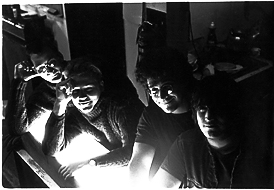

This music often makes very little sense.
I mean, it's twangy and organic, but it's not really country-ish or folky. The opener starts out and you think you've heard this before, but then Sam Prekop starts soloing and you realize that while these guys are deceptively working under the guise of an alterna-folk band, they're also trying to play... well, everything. Except in the same song. Prekop's solo is straight from the book of Grant Green's discordant bluesiness. And then, from there things just kind of spiral and wriggle around in that same vein, with slight variations. You're in for any number of the following: saxophone solos, banjos, backwards guitar solos, some damn thing about crows in a barn, noisy freakouts and dizzyingly difficult bass chords. Sam Prekop's vocals are still in his sporadic phase as he takes on either a quasi-menacing baritone or a ridiculous falsetto for the album's duration. His lyrics give new meaning to the phrase 'stream of consciousness' but they never cross over into stupidity (but I wonder sometimes whether he intended for them to). For being recorded in a time when music was dated within months of its release, this album sounds especially timeless. The only thing that partially betrays its origins is that almost too big sounding drum reverb. But that's such a minor complaint. Their first official "official" album (they had done strictly limited cassette only releases in the preceding years), it was initially limited to 1000 vinyl copies on the band's own Specimen label, but the AUMFidelity label generously reissued it in 2005.
~Austin

This music often makes very much sense, but pretends not to.
A pretty spiffy little evolution —slight as it may be— from that jumbly first record. There's just as much twang here, but it's electrified, which makes all the difference in the world. The songs are better too. Where some of the material on Speckly feels kind of rambling and noodly, pretty much everything here has a good riff off of which the band builds these really unique little tunes. Sam Prekop's voice isn't quite as erratic here and that little restraint makes the material's more serious aspects stick out even more (simultaneous saxophone and banjo solos on "Sad Banjo" is the one thing that really sticks out). Not all that dissimilar from the first album, but there's little bits that definitely make it better. And with some of this stuff, take out the horns and you've got a makeshift Sea and Cake song. So, this is an important record. Good, too.
~Austin



The level of quality here rivals the level of silliness in their old material.
Listening to this in comparison with the early material, it's infinitely more polished, but still sounds like them. They had definitely mellowed out by this point and there are some genuine, honest to goodness ballads here (and furthermore, they're excellent). The melodies and riffs have become a lot more subtle and the focus on song construction has become more sophisticated, but the whole thing is just plain old catchy and listenable. The emerging Sea and Cake jangle of Sam's guitar has fully materialized here and indeed, there are surely more than a few moments that Sea and Cake fans will welcome with open arms. It's fitting that this was their last album because it feels almost as if they knew they had perfected their sound and decided to quit while they were ahead. However, it actually was just the next step in the band's evolution and they splintered apart in different directions in its aftermath. In fact, the lineup of the band changes from song to song and most of the material was recorded at least two years previous to the album's 1993 release. Sam Prekop and Eric Calridge picked up where this album left off when they formed the Sea and Cake and Ian Schneller went on to form Falstaff. One of the best albums... well, ever.
~Austin


Vault clearing, career spanning box set that gives a more focused picture of the early years.
Ever heard a banjo play surf rock? Well, you can hear it done flawlessly and (more importantly) totally believably on "Rocks Are Oil", the track that kicks off this incredible collection. It's a three disc box set, with each disc highlighting a certain period in the band's career. The first disc finds the band in its earliest days, with some of the material dating as early as 1986. It's as perfectly shambling and unkempt as you'd expect. But, just tons of fun. Disc two finds the band really experimenting, from tape manipulations to early Ornette Coleman style free jazz. And finally, disc three dates entirely from the Cavale-era material and it's (predictably) my favorite. Really, this entire box set is excellent and most of the material is exclusive to it. There are a few recognizable titles that pop up, but they are either alternate studio recordings or live recordings. When this set was first released, initial copies came with a fourth disc that featured even more previously unreleased stuff, in addition to a few previously released (but hard to find) tracks. Because it doesn't focus on a specific time period, it features (what feels like) an even more unique conglomeration of things. Although it's fantastic music if you know you're a fan, it can be a little overwhelming if you're a newcomer. In any case, AUMFidelity is to be commended for this excellent set.
~Austin
Seven crows in your barn? Here's a good solution to your problem.